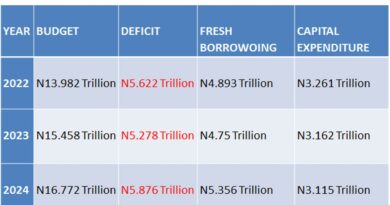CBN is Set to Launch eNaira
When on February 6 2021, the Central Bank of Nigeria (CBN) gave the directive that all deposit money banks in Nigeria should close all cryptocurrency accounts, it was received with misgiving among Nigerians.
Although the CBN through its Governor, Mr. Godwin Emefiele, explained the fears of the apex bank, especially that Cryptocurrencies are not controlled by a singular entity, that directive did not go down well with many Nigerians who are already neck-deep in cryptocurrency trading. Of course, as usual, they continued their trading using alternative means.
With the advancement in technology, everything is now possible, including digital currency.
A thought of that has forced countries to begin research into developing their own digital currencies, to take back the flow of money into their own hands. As Cryptocurrency is totally decentralised, they want to give their citizens an alternate option that is quite similar to Cryptocurrency but will be a centralised one.
A report by the Bank of International Settlements states that over 80 per cent of Central Banks are already researching into what they call Central Bank Digital Currency (CBDC), an electronic form of Central Bank money that citizens can use to make digital payments and store value.
A CBDC offers three main elements: A digital currency, issued by the Central Bank and Universally accessible.
CBN says the objective of the eNaira is to aid financial inclusion, improve payment efficiency, improve revenue and tax collection, targeted social interventions, amongst other objectives.
According to the eNaira guidelines, the first stage of the Central Bank Digital Currency (CBDC) implementation is the Monetary Authority Suite, which instructs that the CBN is the sole issuer and distributor of the eNaira – it also states that the CBN can redeem and destroy the currency.
The second stage is the Financial Institution Suite, which states the eNaira currency request or issuance of stable coins and its management will be done by licensed financial institutions.
Nigerians will be able to send and receive the digital currency at a merchant kiosk at a low-cost payment, while the digital currency will be deposited in a CBN wallet.
Commercial banks and other licensed operators are expected to provide their own wallets to serve as a vault and replace that of the CBN once they all complete the implementation.
To demonstrate its seriousness and ensure that eNaira when it is finally launched in October this year, offers Nigerians all the security it should, the apex bank has selected Bitt Inc. as its technical partner for the launch of Nigeria’s digital currency.
According to the apex bank, Bitt was selected because of its leadership position and proven technical competencies in the industry.
Of the five countries that have so far launched their own CBDC, four of them were designed and executed by Bitt Inc.
It is instructive that the CBN is very meticulous in the selection of a technical partner for the launch of eNaira. According to the bank, Bitt Inc. was chosen through a vendor selection process in line with the public procurement act conducted by seven departmental directors and a deputy governor of the CBN.
The 10 companies evaluated were said to have been graded based on technology ownership and control, implementation timeline, ease of Adoption, platform security, interoperability, and implementation experience.
“Bitt Inc. was key to the development and successful launch of the central bank digital currency (CBDC) pilot of the Eastern Caribbean Central Bank (ECCB) in April 2021,” the CBN said.
Bitt Inc. was founded in 2013 by Gabriel Abed and Oliver Gale, leading minds in the blockchain industry globally. The company was set up to provide infrastructure to support a digital financial ecosystem throughout the Caribbean.
From the profile of Bitt Inc, the CBN made a good choice, picking a company that is run by thought leaders in the blockchain industry. They were also recognised by the World Bank, IMF, World Economic Forum and many other respected international organisations.
According to the World Economic Forum, Gabriel Abed, one of its early investors, is widely recognised as a leading authority on Central Bank digital currencies, math-based protocols and blockchain technology globally, and is the first entrepreneur to establish blockchain companies in the Caribbean from as early as 2010.
It is believed that the introduction of the virtual-money will revolutionise the handling of cash in the country and enhance the cashless policy of the central bank.
–Daniel is an economist based in Garki Abuja




